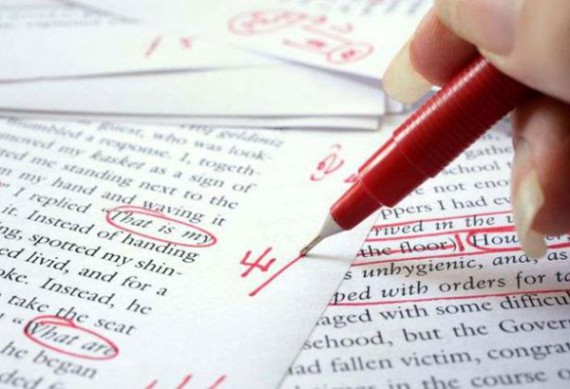The Role of Editors
I have over the years been both editor and edited; currently, I'm both, often in the same day. Some thoughts on the relationship.
Tim Parks writes “In Praise of the Language Police” in The New York Review of Books.
My comments on real or supposed differences between American and British English and the consequent frictions between editors and writers from these two countries provoked such an unexpected response that a few further words seem in order, above all on the vexed question of making texts conform to a hypothetical standard of language and usage or to a specific house style. Behind this apparently innocent editorial dilemma lies the whole issue of what we expect from literature.
Most of the reader responses that came my way were in favor (and indeed favour) of complete freedom for writers, seeing nothing but pedantry in the application of rules and in some cases questioning whether such things can really be said to exist anywhere but in the heads of copy editors and the establishment police. As readers, it seems, we love to feel we are in direct, unmediated contact with an especially creative, possibly subversive mind and that we are getting all of its quirks and qualities unmediated and unmitigated by the obtusity of lesser folks perversely eager to return everything to the expected and mundane. This is no doubt why so little is said about editing even in the more learned papers, while nothing at all appears in the popular press, let alone at a promotional level. One cannot imagine, for example, a publisher launching an advertising campaign to boast that it has the most attentive copy editors in the business and can guarantee that everything you may read from its list has been properly purged of anything grammatically iffy, or foreign, or idiosyncratic.
By the same token, very little is said of the mediating work of translators, even though we know that where a great piece of literature has been translated more than once, the various versions can sound quite different and obviously owe a great deal not just to the technical expertise but also the personality and mindset of people we usually know nothing about. In general, we don’t like to think of creative writing as a joint venture, and when it emerges, for example, that Raymond Carver allowed his work to be drastically edited, our appreciation of him, and indeed the work, is at least temporarily diminished. We want to think of our writers as geniuses occupying positions of absolute independence in relation to a tediously conventional society. Conversely, we abhor, or believe we abhor, the standard and the commonplace.
Yet nobody requires the existence of a standard and a general pressure to conform more than the person who wishes to assume a position outside it. It is essential for the creative writer that there be, or be perceived to be, a usual way of saying things, if a new or unusual way is to stand out and to provoke some excitement. So when D. H. Lawrence in Women in Love writes of Gudrun’s insomnia after first making love to Gerald that she was “destroyed into perfect consciousness,” he needs the reader to sense at once that this is syntactically anomalous; a person can be “transformed into,” “turned into,” “changed into” but not “destroyed into.” The syntactical shock underlines Lawrence’s unconventional view of consciousness as a negative rather than positive state, which again is emphasized by the unexpected use of the word “perfect,” rather than a more immediately understandable and neutral “intense.”
Naturally, anyone writing with this level of creativity needs a copy editor willing to accept that rules can be bent and broken. But that doesn’t mean such editors have no role. It is important that the “special effect” stand out from a background of more conventional prose, and that a deliberate departure not be mistaken as something merely regional, British perhaps, or simply that there not be so much clutter around it of one kind or other that it is hardly noticed. George Orwell, a champion of strict grammar as a vehicle of clear thinking, memorably begins 1984with a very simple, almost embarrassingly conventional novel-opener of a sentence in order that the anomaly constituted by the last word pack a big punch: “It was a bright cold day in April, and the clocks were striking thirteen.”
[…]
But if language habits tend to be national, we live in a world that is more and more international, a world where, certainly in Europe, readers are just as likely to be reading books in translation as in their national language. For translators, and indeed for editors of translations, there is a risk that they might not recognize the exciting subversiveness of a certain usage if they are not entirely familiar with the cultural standard and social context in which it is uttered: the first Italian translation of 1984 has the clocks striking one, not thirteen, its translator apparently unaware of how interesting a clock striking thirteen would be.
The juxtaposition of the roles of editors and translators is interesting, in that the similarity of dilemmas hadn’t really occurred to me before. The reason clocks “striking thirteen” didn’t strike the Italian as interesting is because they do so all the time–at what Americans call 1 pm. I can’t, offhand, think of a way to make the novelty translate; it’s culture, not language, that’s the barrier there.
Parks gets the role right:
The editor’s job then becomes one of helping the writer to see where an unessential, perhaps unconscious departure from the norm is actually draining energy away from places where the text is excitingly unconventional. That is, the editor reminds an author that to construct a coherent identity he has to remember his relationship with society and with the language we share and cannot express ourselves without. To go out on a limb linguistically, accepting no compromise and creating an idiolect that really is entirely your own, may win awed admiration, as did Finnegans Wake, but will likely not attract many readers, and arguably does not allow for the communication of nuance, since all the ordinary reader will understand is that you are indeed off on a trip on your own; even Joyce’s hitherto staunch supporter Pound had no truck with it.
I have over the years been both editor and edited; currently, I’m both, often in the same day. Granted, I do public policy writing, not literature, so, clarity is more important than rhetorical flourish but the essential task is the same.
When I’m writing for publication externally, I encounter three broad types of editors:
- Editors who wish they were writers. Far too many editors see their job as turning your writing into theirs. That is, they rearrange sentences, not to enhance the author’s clarity or impact but rather to reflect their own writing style. Usually, but not always, these are kids right out of college. They’re a pain in the ass to work with and I seldom give them repeat business.
- Editors who don’t edit. The opposite of the first case is the editor–again, usually but not always kids right out of college–who are either too lazy or too timid to challenge their writers. They’re very easy to work with but useless. Often, the first draft that I dashed off in an hour or so gets published as is, errors and all. That’s not doing anyone any favors.
- Editors who make writers better. I’ve had several really good editors over the years. Two that really stand out are Robert Bidinotto, who edited me years ago when he was at the helm of The New Individualist, and Max Fisher, who until a couple months ago edited the International section at The Atlantic. They both helped me in very different ways. Bob, who’s a very gifted wordsmith, sharpened by organization and word choices while leaving the pieces very much in my own voice. Max did some of that but mostly pushed me to be bolder in my conclusions and sharper in my arguments.
When wearing my editor hat, I try very much to be the third type. I see myself having three primary roles:
- Helping the writer get his point across, including getting his point read. While suspense is a useful literary technique, it’s almost always an annoying and counterproductive device for persuasive writing. The first paragraph or two of a public policy piece needs to explain to the reader what problem exists be solved and why the reader should give enough of a damn about it to keep reading. Once that’s accomplished, the argument needs to be laid out as succinctly as possible and organized in a way that flows logically. Even in a book-length project, every interesting tidbit that an author knows about the subject doesn’t belong unless it actually advances the argument.
- The voice of the intelligent but non-expert reader. Things that may be perfectly obvious to the writer, who spends his day immersed in a specialty, often need to be spelled out. So, questions that pop into my head while reading get inserted as comments. Sometimes, the writer will answer that question later in the piece; that means reorganization is likely called for. Otherwise, expansion is called for. Alternately, it turns out that the writer pulled the idea out of his fourth point of contact and can’t back it up when challenged; in such cases, redaction is the answer.
- Helping the writer avoid looking like an idiot. While I’m not a copy editor, I do try to catch obvious errors of spelling, grammar, and punctuation. While I’m not a fact checker, I do flag statements that I either know are untrue or that seem debatable but aren’t backed with evidence or citation.
If there’s a House style, I do try to enforce it. If nothing else, inconsistency in spelling and format within a piece is annoying. Even there, though, I make exceptions if there’s a good reason to do so. For example, one of my regular contributors to New Atlanticist is a Brit and I generally convert his spellings to the American standard, since that’s more familiar to our readership. In a couple of cases, though, he’s penned pieces in tribute to fallen British heroes or that otherwise appealed to a British national sentiment; there, the British flavour seemed appropriate and I left it.
Finally, I’d note than even editors need editors. The writer is just too close to his own work to objectively serve as his own final editor.
UPDATE: This commentary by Geri Henze on the previous piece by Parks that sparked the followup sums up my thoughts more succinctly:
Editors and their guidelines have never been beloved among among writers. Personally, as a writer, I despise editors and accuse them variously of: 1. having no true feeling for prose or the importance of an author’s voice, 2. merely substituting their preferences for mine (mine are doubtless better informed and result in superior writing), 3. being corporate flunkies willing to obey any order from above to keep their jobs or further their careers, and 4. being envious, wannabe writers.
As an editor, however, I despise writers because: 1. they think some higher talent or mission excuses them from studying grammar and usage, 2.they fail to recognize my ability to spot difficulties they have overlooked, because they fail to recognize that while they know what they have in mind, readers don’t, 3. they view themselves as artists but think of me as a low-level technician serving corporate interests, and 4. they are envious of anyone who has a real job and a regular paycheck.
Quite.







While I’m not a peevologist in grammar or word choice, I do get ticked when big-foot writers seem immune to editorial functions. Mostly, the problem (for me) is that editors dare not suggest cutting repetitive or truly excessive text.
I find the issue to pertain in both fiction and non-fiction books written by best-selling authors.
Good read. ..and… good thing no one has the daunting task of editing comments!
I’ve never bought the notion that you need to know the rules before you break the rules, at least not as regards fiction. What I tell people who ask me is that as a writer of fiction you have to write in such a way that your reader understands what you’re saying and reads all the way to the end. If you’ve done those two things you’ve done your job. The third thing of course is to get paid.
Tell your story, engage your reader, cash your check, pour yourself a drink.
People who depart from “the rules” don’t usually do it to sound cool or rebellious, they do it because that’s what they need to do to tell the story. For example the rules don’t allow for little things like pacing. Sometimes you don’t want a full sentence because it reads slow, and you need the reader breathless. So you break up sentences. You drop in stand-alone words, single word paragraphs.
Other times you want the reader frustrated. You use long run-on sentences because you want the reader to be fighting the urge to skip ahead, you want them irritated that it’s taking you so long because you can then use that pent-up emotion. You break the rules to fwck with the reader, to tease or surprise. Sometimes I wish I could control the physical size of pages because it would be fun to force them to whip through increasingly small pages, or groan when they get to a long page.
That said, the editor is vital, but not as grammar police. I wrote a book which shall remain nameless where I screwed up a basic thing: I didn’t attach the reader closely enough to my lead character. My screw-up, but also the editor’s. There is something to the fact that an established author gets less push-back. Some kid fresh out of Brown doesn’t want to tangle with me, so she takes out on some newbie.
The best editors are confident enough and experienced enough to push back without trying to turn it into their book. Smart writers may get irritated when this happens, but if they really are smart writers they often end up feeling grateful.
Ahh yes, America and England, 2 countries separated by a common language.
@michael reynolds: Meh. Get back to me when you get a Newbery award.
But, yes, an editor has to understand the craft enough to get what the author’s trying to do. I don’t have the literary background to be a useful editor of novels. I’ve mostly taught myself to write from reading and am not steeped enough in most literary genres to have an intuitive feel for pacing. Maybe I could do historical fiction or science fiction.
@OzarkHillbilly: Indeed. After four centuries, there’s actually been a lot of divergence. Not quite so much as with Portuguese, where the Brazilian variant has totally overwhelmed the parent language, but pretty starkly.
Eh; I dont know about the hole primese of this article. I’ev never needed an editro my self;
@OzarkHillbilly:
Yes, I learnt that reading the Economist.
Far too many editors see their job as turning your writing into theirs.
True dat. Teaching freshman comp helped cure me of that, to the extent one is ever cured: the sheer mass of ERROR errors, drove out any consideration of “I would have done it like this” so-called “errors.”
I used to tell my students, No one will ever pay this much attention to your writing again, because in the real world, no one has to keep reading something that’s long or sloppy or boring.
And while I’m a pretty good writer, today I suffer from the problem that many lawyers are Type Two editors, in JJ’s classification.
@James Joyner:
Sigh. It’s going to be a long year for me.
@michael reynolds: What was that after “cash your check”? Just do more of that.
Great piece. I think your breakdown of the types of editors is spot on. Having worked for many year as an editor, I always felt my job was to act as clean-up crew–not altering an author’s style but enhancing clarity and flow.
@Fiona:
From my experience, the editor or copyeditor’s best or worst friend was the acquisitions editor. Manuscripts rotted from the head, I found.
@sam: I was an acquisitions editor for 18 months or so. Weird job. But I signed authors on the basis of proven written work, not just pitches. Often, I went after people who’d written interesting articles where I saw an obvious path to expansion into a book.
I did a lot of editing while in Japan. Usually of scientific articles and chapters for books. Didn’t have any time for that “voice of the author” fancy-pancy stuff–I was simply trying to get it into something approximating English. (pulls hair)
Translation is an absolute bitch and flounders on cultural dissonances all the time. How do you get across the fact that Arsene Lupin calling someone he meets on the street “tu” carries a complete different impression than if he had called him “vous”? Or how to keep the Italian pun on lawyer vs. avocado, which definitely doesn’t translate?